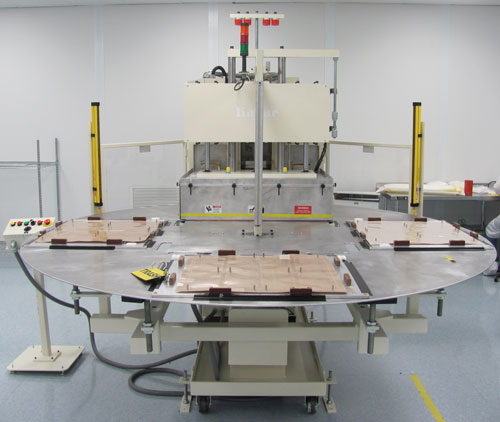UFP Technologies Expands Illinois Plant
The components manufacturer has spent $550,000 adding a cleanroom and new equipment to increase its production capacity.
October 7, 2013

UFP Technologies spent $550,000 adding a cleanroom with three new pieces of equipment to its manufacturing plant in Glendale Heights, IL. The contract manufacturer bought a new high-speed die cutter, radio frequency welding equipment, and a heat sealer “to run product in a clean environment,” says Michael Zumpano, general manager of the Illinois plant. The gear and cleanroom setup mean UFP can increase output at the facility by more than 1 million parts per week, he says.
UFP specializes in custom-engineered components and packaging using foams, plastics, composites, and natural fibers.
Measuring 2000 sq ft, the new Class 100,000 cleanroom has received ISO 13485:2003 certification for production of Class III medical devices, Zumpano says. Device market segments that will benefit include medical contract packaging, medical component manufacturing, “and possible device applications,” he says. UFP’s domestic and foreign customers manufacture medical implants, prosthetics, devices, and components, he says.
Zumpano claims the ISO mark has helped UFP gain business from competitors that aren’t certified. Medical device OEMs increasingly demand that component manufacturers have ISO 13485:2003 certification because the standard is compatible with many FDA regulations, according to Zumpano. “They are looking for somebody who can support their documentation, the certification that goes along with those shipments, and the traceability of materials,” he says, adding that the process of receiving the ISO certification takes approximately “six to nine months of work.”
Seven of UFP’s 11 plants have ISO 13485:2003 certification. The Illinois facility received the certification in 2011. UFP “chose very quickly” to apply for ISO 9000 and 9001 certification before moving to the 2003 designation because of the standard’s requirements regarding factors such as traceability and the retention of information for the lifetime of a device or component, Zumpano says.
Calling the expansion “a solid investment,” Zumpano says the Illinois plant has 53 employees working in three shifts. The staff includes design manufacturing engineers, quality continuous-improvement engineers, CAD technicians, general machine operators, and a plant inspector.
The market for products made from medical-grade foams and related materials is “very competitive,” Zumpano says, and suppliers must offer their customers “something that is truly unique or beneficial.” Speedy design execution is a must, he notes, adding that same-day parts delivery is an additional capability that attracts medical OEM customers. “They’re looking for vendor-managed inventory, where we ship to a local warehouse and bill only when the product is pulled from that warehouse,” Zumpano says.
UFP “absolutely” has felt the impact of the fluctuating cost of oil on materials prices, Zumpano says. Most of the foam material used by the company is petroleum-based, and the recent rise in the price of oil has led to increases in UFP’s chemical costs. “We’ve done a great job internally to absorb some of these costs and use lean manufacturing to maintain our margins and profitability,” Zumpano says. “We’re not passing the increases to our customers.”
You May Also Like

.png?width=300&auto=webp&quality=80&disable=upscale)
